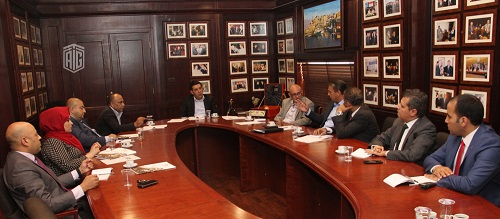E-government Committee, TAGKF discuss barriers for implementing e-government
13 Dec 2017AMMAN- One of Talal Abu-Ghazaleh Knowledge Forum (TAGKF)’s committees, The E-government Committee, held numerous meetings to discuss means and barriers for the complete application of e-government at various institutions and departments.
 The committee stressed the significance of digital government services for the elimination of administrative corruption and combatting favoritism and nepotism. The committee is headed by Nidal Bitar, Executive Director & CEO of the Information and Communications Technology Association of Jordan (int@j), and with membership of Eng. Sami Al Dabbas, Eng. Samer Al-Hamarneh, Mr. Nidal Abou El Foul, Eng. Ahmed Abu Kaoud, Dr. Emad Al - Mualla, Mr. Ibrahim Almubaidin, Mr. Ibrahim Al-Khuraisat, Eng. Nasser Saleh, Eng. Islam Al Heramashah, Mr. Faisal Al-Tamimi, Dr. Nehaih Hammoud and Eng. Mohamed Nakhalah.
The committee stressed the significance of digital government services for the elimination of administrative corruption and combatting favoritism and nepotism. The committee is headed by Nidal Bitar, Executive Director & CEO of the Information and Communications Technology Association of Jordan (int@j), and with membership of Eng. Sami Al Dabbas, Eng. Samer Al-Hamarneh, Mr. Nidal Abou El Foul, Eng. Ahmed Abu Kaoud, Dr. Emad Al - Mualla, Mr. Ibrahim Almubaidin, Mr. Ibrahim Al-Khuraisat, Eng. Nasser Saleh, Eng. Islam Al Heramashah, Mr. Faisal Al-Tamimi, Dr. Nehaih Hammoud and Eng. Mohamed Nakhalah.
The members of the committee stressed the necessity for reviewing and enacting laws and legislations regulating the function of e-government. They also affirmed the importance of providing awareness-raising and educational programs to inform citizens about the significance of technology as a means to facilitate daily life. They also highlighted the necessity for the provision of training programs for employees on the use of technology in a bid to help them accomplish their tasks efficiently and to reassure them that electronic services aren't replacing them, but helping them in their tasks.
According to the statements, (to date), the government provides at least 2,000 government services. Around 150 e-services have been launched, however, most of them are not user-friendly, and they are not from a single platform.
The members affirmed the importance of introducing a single platform to launch electronic services for citizens either through the computer or the smartphone to help them access and avail multiple e -services. Providing and delivering prompt and effective e-services through a single platform will eliminate the need for citizens to visit multiple websites, and any changes or developments in government services can be dealt with efficiently and promptly through a single platform. They also confirmed the necessity for the activation of a Public-Private Partnership Unit, citing that the private sector is now providing electronic services at its institutions or at universities. Hence, the implementation of e-government services must be accelerated to be in line with the private sector.
All members also underlined the necessity of promoting e-services for citizens in a deliberate clear scientific method.
They agreed that the incapacity hasn’t been caused by techniques or lack of efficiency, but rather by the lack of strong, real will of the decision makers, as well as the impairment of administrative and financial structures applied in e-government programs for the efficient, quick and ongoing fulfillment of all services provided to citizens.





